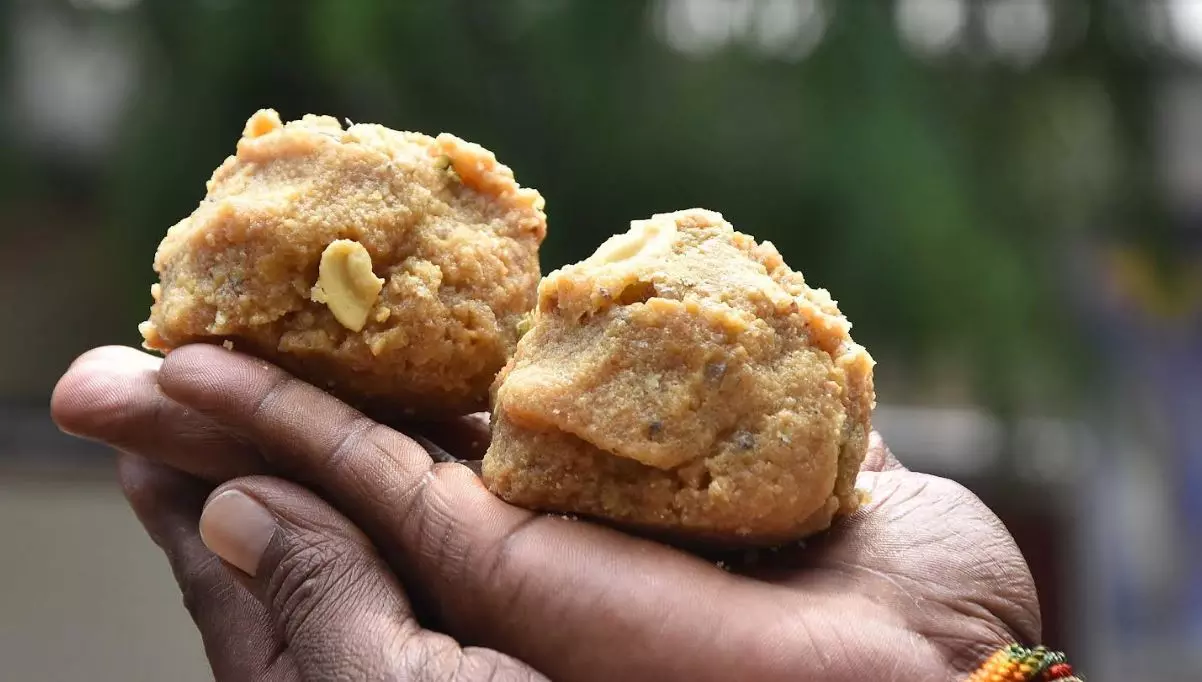
Tirupati:Srivari Laddu, the sacred prasadam offered to devotees, who, many a time, queue for tens of hours for the darshan of Sri Venkateswara Swamy in Tirumala before they receive the laddu, has become embroiled in a significant controversy with allegations of adulterated ghee used in its preparation.
The row, essentially between political parties, has sparked a nationwide debate. In addition, devotees are concerned about the quality and sanctity of the offering, which they have received and eaten with utmost reverance.
The Tirumala Srivari Laddu has a history of over 310 years. It has been a central part of the temple rituals since 1715. Originally offered as “boondi,” it took its current form of a round laddu in 1940. Devotees purchasing the laddu and distributing it to friends and relatives has become customary.
Over the years, its recognition in the world has risen. In 2014, it received the much-sought-after GI (Geographical Indication) status, ensuring that no other entity can sell laddus under the same name, thereby protecting its unique identity.
A defining feature of the Tirumala Laddu is its meticulous preparation, adhering to a recipe known as “Dittam,” which has been modified only six times in history.
“For every 5,100 laddus, we use 165 kg of cow ghee, 180 kg of Bengal gram flour, 400 kg of sugar, 30 kg of cashews, 18 kg of raisins, eight kg of cardamom, and four kg of rock sugar. Each ingredient is precisely measured to maintain the laddu’s traditional taste,” a senior official of the Tirumala Tirupati Devasthanams (TTD) involved in laddu’s preparation informed Deccan Chronicle.
The process of preparing the Srivari Laddu begins by mixing gram flour and rock sugar. Both are then fried in ghee to create boondi. They put sugar syrup, nuts, raisins and spices in the boondi to shape the final laddus.
Initially, frying had been on wood-fired stoves. It has now shifted to steam-based cooking. Currently, around 3–3.5 lakh laddus are produced daily by over 700 staff members, about 600 of them Sri Vaishnavite Brahmins.
An official overseeing quality control explained: “Laddu is prepared with great care following strict Vastu principles at a designated place in the Agneya (southeast) area of the temple. Before the laddus are offered to Lord Venkateswara Swamy, they are first presented to his mother Vakula Mata as part of the temple’s age-old customs for Her approval.
Srivari Laddu’s production has increased from 5,100 in the past to over 3 lakh to 3.5 lakh per day to meet the high demand. About 15 metric tonnes of ghee is used daily for making laddus. Their sales generate around ₹500 crore annually. Making one laddu costs the TTD around ₹48. The devasthanam sells it for ₹50.
A senior official stated: “The production process is rigorously monitored to ensure quality. Each batch of laddus is tested in our state-of-the-art laboratory to guarantee the correct weight of 175 grams. It is ensured that the amount of ghee, cashew, sugar and cardamom is just right.”
However, recent allegations over the adulteration of ghee have cast a shadow on the revered prasadam.
AP Chief Minister N. Chandrababu Naidu has claimed that during the previous YSR Congress Party’s administration, ghee adulterated with animal fat had been used for preparing the laddus.
Previously, complaints from devotees had been that laddus have become dry and less rich in ghee and cashews, compared to the past.
A report of the TTD from 2016 highlights the importance of ghee in preparation of the laddu. The report states that each laddu contains approximately 40 grams of cow ghee. “Ghee is vital for the flavour and aroma of the laddu. If this is compromised, it changes the entire taste,” the report emphasized.
Following laboratory tests in July 2024, the TTD discovered that the ghee supplied by AR Dairy Foods Private Limited contained foreign fats. This prompted the temple body to blacklist the contractor.
TTD executive officer J. Syamala Rao said: “When the lab results confirmed the presence of foreign fats in the ghee, we immediately blacklisted AR Dairy Food and switched to suppliers we could trust. Now, we are procuring ghee from Karnataka Milk Federation and Alpha Dairy at ₹475 per kg, whereas earlier we were paying ₹320 per kg.”
Syamala Rao has reassured devotees that corrective steps have been taken to restore the purity of the laddu. “The Tirumala laddu is not just an offering. It is an emotion for millions of devotees. The quality is now back to its original standard. The devotees can rest assured that only pure cow ghee is being used. We will do everything necessary to ensure its purity is never compromised again,” he emphasised.
Infographics for Tirumala Laddu
Laddu’s Key Historical Milestones:
1715: Offered as “boondi”
1940: Evolved into laddu form
2014: GI Status received
—
Cost and Pricing:
Production Cost per Laddu: ₹48
Selling Price to Devotees: ₹50
Revenue: Approximately ₹500 crore annually
Tirupati Laddus in Various Sizes:
Small laddu (approx. 40 grams): Given free of charge to all devotees after darshan.
Medium laddu (175 grams): Priced at ₹50 per laddu.
Big or Kalyanotsavam laddu (750 grams): Available for ₹200.
